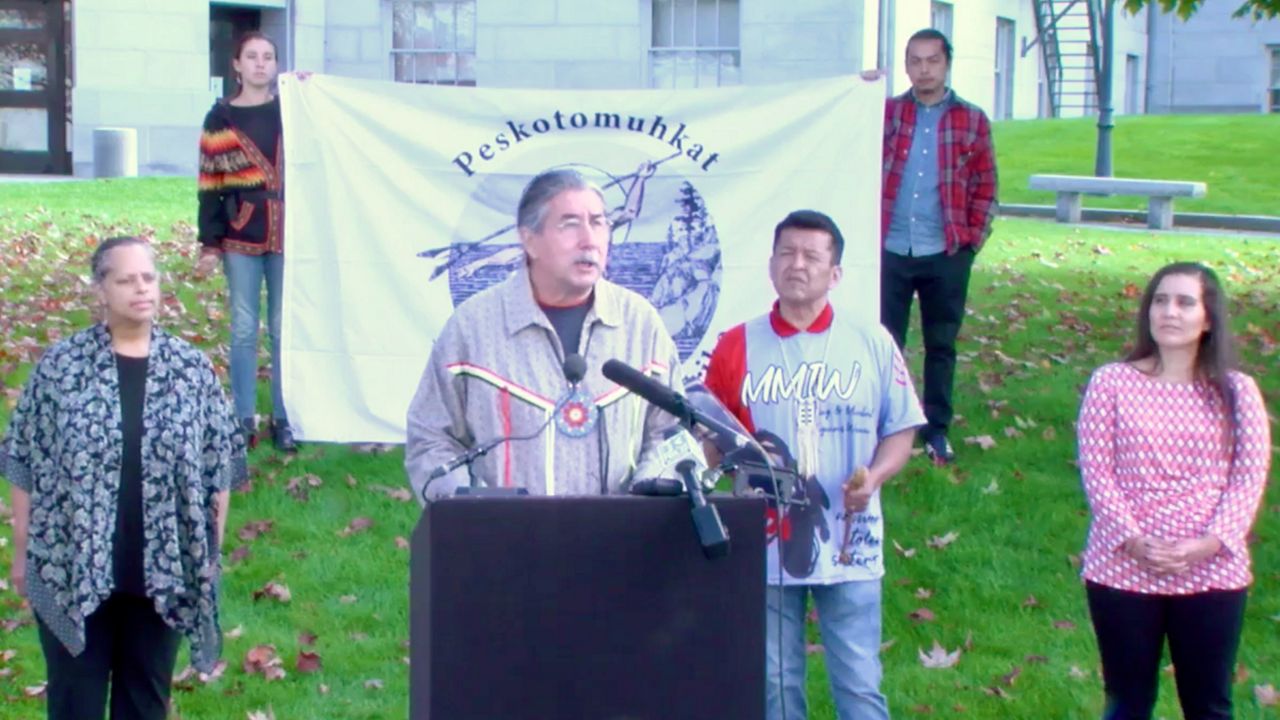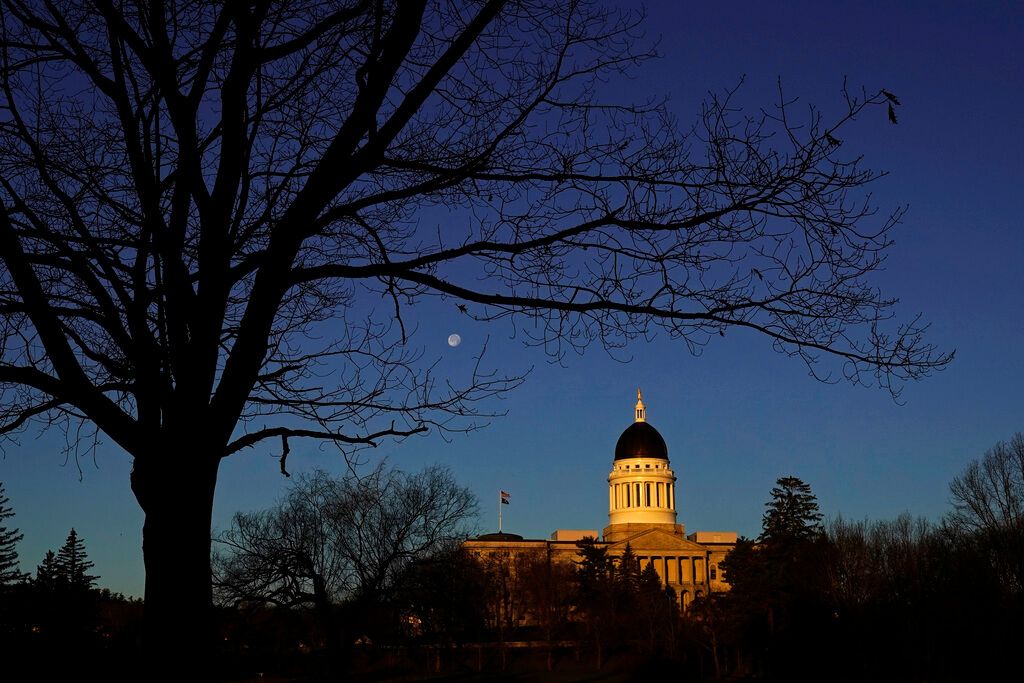At a virtual rally that attracted hundreds of viewers on Indigenous Peoples’ Day, Maine’s Native tribes called on Gov. Janet Mills to restore their rights to self-governance in the state in 2022.
The rally in Augusta and online was led by the Wabanaki Alliance, a relatively new advocacy group that includes Maine’s four federally recognized tribes: the Penobscot Nation, Passamaquoddy Tribe, Houlton Band of Maliseet Indians and Aroostook Band of Micmacs.
Maine, in 2019, joined a handful of states that officially observe the holiday. President Joe Biden is now the first president to commemorate it with a White House proclamation. And Maine Congresswoman Chellie Pingree, a Democrat, is co-sponsoring a new bill that would fully replace the federal Christopher Columbus Day holiday with Indigenous Peoples’ Day.
But even as the Mills administration embraces that change at the state level, the Maine tribes say the Democratic governor has consistently worked against their hopes for true sovereignty.
“If we don't implement meaningful changes in the state at a policy level ... Indigenous Peoples’ Day will feel empty,” Penobscot Nation ambassador Maulian Dana said at the rally. “It will feel like just another broken promise.”
Tribal leaders and non-Native supporters, including dozens of nonprofits and businesses, want Mills and the state to pass LD1626 next session. The bill would essentially revert Maine to federal Indian law, allowing tribes to govern more of their own affairs on their land — including environmental protection, taxation and economic issues, criminal justice and more.
“We're not just talking about policies and resources and federal funding… we're also talking about those very core tenets of who we are,” Dana said. “Being able to have our sovereignty recognized and respected makes it so that we can heal from our intergenerational trauma.”
Maine is unique in not granting tribes full rights to self-governance, under its 1980 Indian Land Claims Settlement Act. The bill at the center of Monday’s rally would reform that act, and was held over in the legislature earlier this year after Mills signaled she opposed it.
The governor has raised concerns that LD1626 is too sweeping and could lead to legal conflicts or problems for the state, towns and businesses, including the timber and construction industries.
Her spokeswoman, Lindsay Crete, said in an email that any changes to the settlement act "cannot be unilaterally repealed or amended in the future by the Legislature, even if it becomes clear that new provisions ... have led to unintended consequences."
To that end, she said the Mills administration wants to be "thoughtful" and "deliberative" in working on new legislative language, in order to "avoid inadvertent disputes and litigation in the future that could set back the State’s and Tribe’s relationship."
Crete said Mills' office has met every week with tribal representatives since this past July "to work towards consensus on measures related to LD 1626 and will continue that work in good faith."
"Fundamentally, the Administration is fully committed to working closely with the Tribes and believes that when the Tribes and the Administration sit down and negotiate difficult policy matters, progress is made for all," she said.
But tribal leaders say the governor's office has not met them in the middle on discussing real changes to the status quo.
“Governor Janet Mills has been steadfast in maintaining the systemic norm of oppression… holding tribes hostage with her lack of interest in engaging us with real discussions of tribal-state relations,” Passamaquoddy Tribe vice chief Darrell Newell said at the rally.
Portland Democratic state Rep. Rachel Talbot Ross, the sponsor of the reform bill, called the 1980 settlement act a “failed experiment” that is inhibiting larger progress on racial justice and equality in Maine.
“Two hundred years of state governance over tribal nations have produced extreme poverty, short life expectancies, poor health, limited educational opportunities and diminished economic development in their communities,” Ross said. “From not being able to address carcinogenic drinking water, to not being able to support the victims of domestic violence on their lands, tribal nations can no longer wait to govern their own internal affairs and their lives.”
The rally also included native music and presentations about environmental and cultural initiatives. Houlton Band and Maine Indian Tribal-State Commission member Zeke Crofton-Macdonald said Mainers must recognize the nation’s history of Native oppression.
“This is what the young people say when we scream ‘land back,’” he said. “If we are to create a system of governance built on concepts like justice, then these injustices need to be taught, and they need to be rectified. The fact that we have Native nations today living in poverty on their unceded territory should be a national disgrace. Each and every one of us should be angry.”
State Senate President Troy Jackson, a Democrat who supports the sovereignty bill, said greater tribal access to environmental and economic aid would help all rural Mainers.
“Why would we not act the same as the other 49 states in that regard? Because that's what we're doing,” he said. “We're leaving transportation infrastructure, educational opportunities, economic growth and protecting our shared heritage of hunting on the table.”
Organizers urged attendees to call and email Mills’ office in support of the bill. And Dana said people should reach out to state legislators, family and friends who are skeptical of it.
“I would challenge you to find somebody outside of our choir… who is adding to the fear-mongering about this legislation, who is making it seem like tribes are getting special rights, who is making it seem like the tribes are going back on a deal,” she said. “Find them, have a hard discussion and educate them about racial equity and how that relates to tribal sovereignty.”
Mills’ office separately issued a statement about Indigenous People’s Day, saying: “Let us pay tribute to those who were the first stewards of this land we love; celebrate their many contributions to our great state; and recommit ourselves to our shared home and future, with respect and trust for one another.”
The statement pointed to other steps Mills’ office has taken to support tribal rights, including banning Native American mascots and expanding tribal domestic violence prosecution rights.
“The Mills Administration remains committed to finding common ground and making important progress with Maine’s Tribal Nations,” the statement said.
This story was updated Tuesday morning with links to more information and a statement from the Mills administration on the tribal sovereignty bill.









